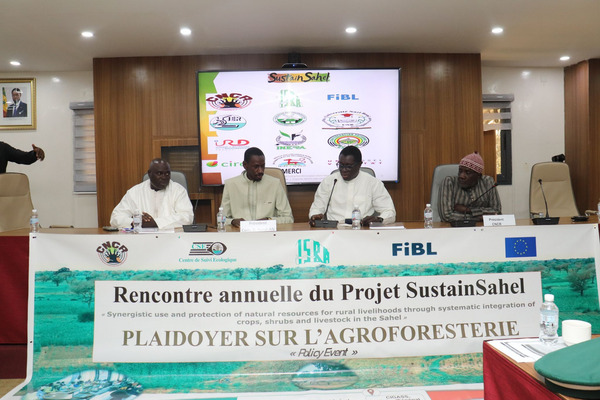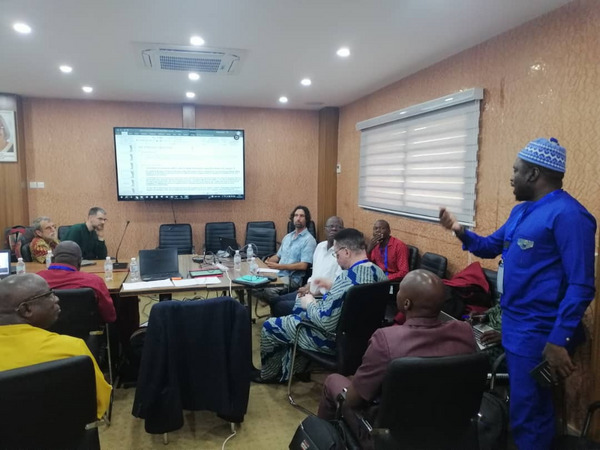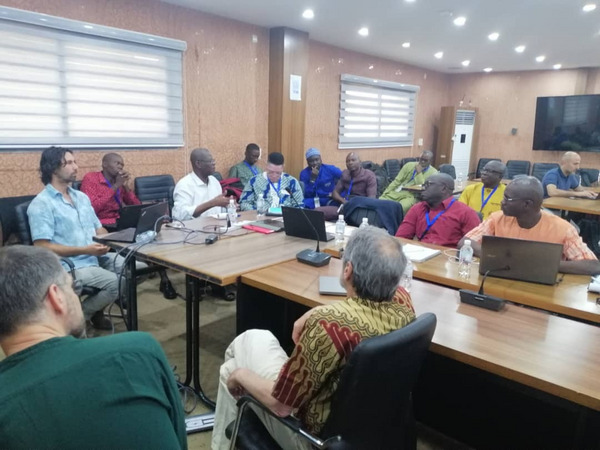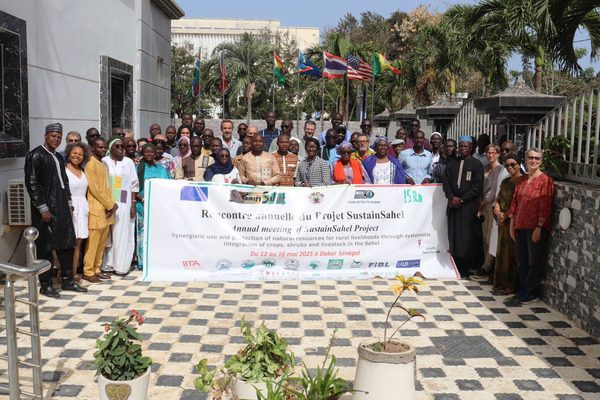Élaborées par des groupes de travail transnationaux réunissant des représentants de différents partenaires du projet, ces recommandations reflètent l'expérience acquise sur le terrain et les échanges avec les agriculteurs, les chercheurs et les acteurs de la vulgarisation au Burkina Faso, au Mali et au Sénégal. Elles mettent l'accent sur des mesures concrètes à l'intention des décideurs politiques, telles que le renforcement des droits fonciers et forestiers, la décentralisation du financement et le soutien aux systèmes de vulgarisation dirigés par les agriculteurs, afin de promouvoir des systèmes agro-sylvo-pastoraux résilients et durables.
Les recommandations s'appuient sur les conclusions d'institutions de recherche nationales, l'IER (Mali), l'UNB et l'INERA (Burkina Faso), l'IPR/IFRA (Mali), le CSE (Sénégal), l'ISRA (Sénégal), FiBL (Suisse), l'U-HOH (Allemagne) et l'Uni Kassel (Allemagne), en partenariat avec le CIRAD, l'IRD et des groupes de producteurs locaux.
→ Recommandations finales aux agriculteurs ici
→ Recommandations finales aux chercheurs ici
Recommandations à l'échelle régionale (CEDEAO, UEMOA, CILSS, CORAF, etc.)
Favoriser l'harmonisation des politiques agroécologiques régionales
- Élaborer un cadre commun de référence sur l'agroécologie, intégrant les espèces ligneuses indigènes (Faidherbia, Guiera, Piliostigma) et exotiques (Gliricidia, Leucaena) dans les systèmes de production agro-sylvo-pastoraux.
Soutenir les programmes régionaux de formation et de transfert de technologies
- Développer des plateformes régionales de formation et de partage de connaissances, notamment pour les pratiques comme le paillage, le compostage et l'intégration des arbustes.
Appuyer la recherche-action à grande échelle
- Financer des recherches participatives multisites, fondées sur les approches pilotes réussies du projet SustainSahel, en intégrant les indicateurs de résilience, productivité et adoption.
Recommandations à l'échelle nationale (gouvernements, ministères sectoriels)
Intégrer l'agroécologie / l'agroforesterie dans les politiques agricoles et environnementales
- Reconnaître officiellement les pratiques agroécologiques / agroforestières efficaces (paillage, compost, arbustes fertilitaires) dans les programmes de soutien à l'agriculture résiliente.
- Promouvoir davantage les politiques de mise en défens et des jachères individuelles et communautaires, pour améliorer la production de fourrage, la fertilité du sol, et la biodiversité, grâce à la présence d'arbres.
Réviser les cadres réglementaires pour sécuriser les initiatives paysannes
- Réviser les Codes forestier et foncier pour reconnaître les droits des agriculteurs sur les arbres qu'ils plantent dans leurs exploitations.
- Encourager l'application et l'appropriation du contenu du Code forestier reformé à travers des mécanismes ou dispositions appropriés (conventions/chartes locales) traduites dans les langues appropriées.
Soutenir l'approvisionnement en intrants agroécologiques
- Développer une chaîne d'approvisionnement en matériel végétal (plants d'arbustes, outils de compostage), notamment en subventionnant les pépinières communautaires.
Renforcer la vulgarisation agroécologique et agroforestière avec les agriculteurs leaders
- Instituer un dispositif national d'animateurs-paysans leaders formés, comme levier de démultiplication des pratiques éprouvées (1 leader atteignant 20 à 40 producteurs).
Recommandations à l'échelle locale (collectivités, services déconcentrés, ONG, organisations de producteurs)
Appuyer la mise en œuvre de plans locaux de transition agroécologique
- Intégrer l'agroécologie et l'agroforesterie dans les plans de développement locaux (PDL) et les budgets des collectivités territoriales, en s'appuyant sur les résultats du projet SustainSahel.
Valoriser les savoirs paysans et les espèces ligneuses locales
- Organiser des foires de l'innovation paysanne, des démonstrations champêtres et des échanges entre communautés autour des espèces comme Guiera senegalensis et Faidherbia albida.
Créer des cadres locaux d'apprentissage
- Mettre en place des champs écoles paysans agroécologiques (CEPA) pour renforcer l'apprentissage collectif et la pratique des techniques comme le paillage ou la gestion de la biomasse.
Cibler les contraintes concrètes à l'adoption
- Mettre en œuvre des fonds locaux d'appui à la transition agroécologique, permettant de surmonter les barrières liées au financement, à la main-d'œuvre ou aux intrants.
Conclusion
En conclusion, ces recommandations appellent à des mesures concrètes et spécifiques à chaque niveau afin d'accélérer les pratiques agroécologiques et agroforestières au Sahel. Au niveau régional, l'harmonisation des politiques de la CEDEAO, de l'UEMOA, du CILSS et du CORAF autour d'un cadre commun en matière d'agroécologie et d'agroforesterie, tout en soutenant la recherche participative à grande échelle, permettra de jeter les bases d'un impact transfrontalier. Au niveau national, il est essentiel de garantir les droits fonciers des agriculteurs sur les arbres, de réviser les codes forestiers et fonciers et de mettre en place des chaînes d'approvisionnement pour les semis et les outils de compostage afin de développer ces pratiques. Au niveau local, l'intégration de l'agroécologie et de l'agroforesterie dans les plans de développement, le financement de fonds de transition et le renforcement de la vulgarisation entre agriculteurs par le biais de leaders formés garantiront que les politiques se traduisent par une adoption réelle. Ensemble, ces mesures s'attaquent directement aux obstacles liés à la propriété foncière, aux intrants, au financement et au partage des connaissances, créant ainsi un environnement propice à des systèmes agro-sylvopastoraux résilients, productifs et riches en biodiversité, pilotés par les agriculteurs eux-mêmes.








 Souhaitez-vous ajouter le site web à l'écran d'accueil ?
Souhaitez-vous ajouter le site web à l'écran d'accueil ?